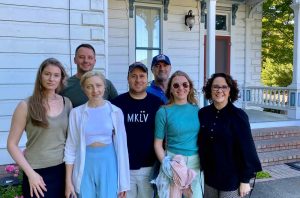A group of Ukranian vintners visit Napa’s Grgich Hills Estate.
In an effort to extend hope and valuable viticultural knowledge, winemakers and wine industry professionals from war-torn Ukraine visited the bucolic Napa Valley, offering a moment of respite from the Russian invasion of their home country, which began in February of 2022. The event was centred around lessons in regenerative wine growing but included site visits, cultural exchanges and broader lessons about wine growing, various fermentation lessons and best practices.
Violet Grgich, president and CEO of Grgich Hills Estate, whose father, Miljenko ‘Mike’ Grgich, who famously came to Napa Valley from Croatia, hosted the Ukrainian delegation. ‘We are deeply honoured to share our expertise in regenerative practices with our Ukrainian colleagues,’ said Grgich. ‘This programme is a testament to our belief that agriculture bridges cultures and supports communities through the most challenging times.’
Ukraine has recently become a darling in the wine world, a world in awe of the country’s undeniable resilience. Fittingly, lessons on vineyard resilience and climate change were part of the programme in Napa. Exploring Napa’s unfortunate experience with wildfire recovery in the vineyards, bio-diversity, and climate impacts were all part of their learning.
DWWA results out 19 June!
Be the first to know: Subscribe to the DWWA newsletter
One of the Ukrainian winemakers, Pavlo Magalias, is a veteran of the Ukrainian military and has recovered several spent warheads from his Olbio Nuvo vineyards, which became part of the frontlines during Russia’s initial invasion.
‘We have learned a lot about the science of regenerative farming this week,’ said Svitlana Tsybak, CEO of Beykush Winery. ‘It has opened our eyes to new ways of working with our grapes and making the soil healthy while also having a positive impact on the environment. We are very grateful for that and for the friendships that we have made in Napa Valley. We are especially grateful to Violet Grgich and Ivo Jeramaz [winemaker for Grgich Hills Estate] for hosting us.’
In addition to their time at Grgich, Napa’s guests visited with Ames Morison in the vineyards at Medlock Ames in Healdsburg.
The Ukranian delegation in the vineyards at Medlock Ames. Credit: Roots of Peace
The technical viticultural and oenological curriculum included:
Climate impact and vineyard resilience
Principles of regenerative viticulture
The oldest regenerative organic Cabernet Sauvignon vineyard in Napa – how to work with old vines
Review pruning procedures and impact on vineyard yields
Vineyard diversity, pest mitigation and new vineyard care
Vineyard recovery after fires
Napa’s AVAs and their similarity to Ukrainian viticultural areas
Natural winemaking using wild yeast fermentation techniques
Grgich Hills Estate winemaker Ivo Jeramaz reflected on his own experience in Croatia during the 1990s. ‘We are heartbroken for them. We know what it means, it’s similar. Obviously, Russians and Ukrainians are brothers, same as us and the Serbs.’
‘This collaboration is a powerful stride towards healing and growth for Ukrainian vintners,’ said Heidi Kühn, founder and CEO of Roots of Peace. ‘We are planting seeds of hope and economic stability for war-torn communities by imparting sustainable and peace-centric agricultural practices.’
Related articles
Ukraine wine harvest 2023: Sipping resilience
The release of the Ukrainian ‘Grad Cru’
Ukraine’s defiant winemakers look to EU and exports
The post Napa Valley opens its doors to Ukrainian winemakers appeared first on Decanter.
